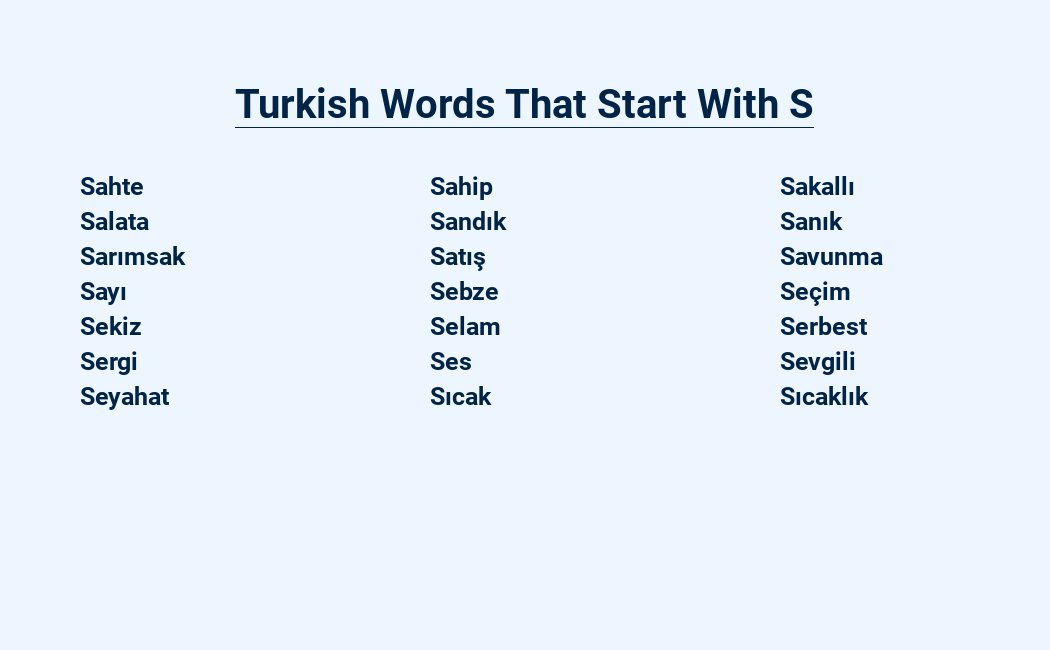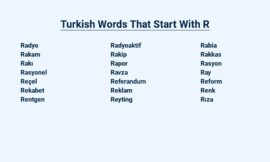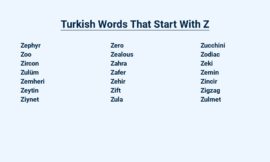Enrich your vocabulary and embrace the beauty of Turkish language with my curated list of Turkish words starting with the letter “S.” From everyday objects to abstract concepts, these words will enhance your communication skills and deepen your understanding of Turkish culture.
Let’s dive into the world of Turkish words that begin with “S!”
| Word | Meaning |
| Saç | Hair |
| Sabaha | In the morning |
| Saat | Hour |
| Sabah | Morning |
| Sabır | Patience |
| Sabun | Soap |
| Sac | Hair |
Turkish Words starting with S
Sağ (Right)
Sağ (Right) is a common Turkish word that denotes the direction opposite to left.
It is also employed to indicate the correct or appropriate side or course of action in various contexts.
Sağ signifies the dominant hand for most people.
Sol (Left)
Sol, meaning “left” in Turkish, is commonly used in everyday conversations and written text to indicate the direction opposite to the right.
Its usage extends to various contexts, including giving instructions, describing locations, and expressing political ideologies.
Saat (Clock)
Saat is the Turkish word for clock.
It can refer to any type of clock, from a simple wall clock to a complex grandfather clock.
Saat is derived from the Arabic word sa’ah, which means “hour.”
Sallamak (To Shake)
Sallamak, meaning “to shake,” is a commonly used Turkish verb. It can refer to a variety of shaking motions, such as shaking one’s head, shaking a bottle, or shaking hands.
The word is also figuratively used to describe the act of stirring up emotions or causing a commotion.
Seyahat (Travel)
Seyahat (Travel): Embark on an unforgettable journey filled with new experiences and cultural discoveries. Explore hidden gems, savor unique flavors, and create lasting memories as you traverse the globe.
Sinema (Cinema)
Cinema, a form of visual storytelling, has captivated audiences worldwide.
Derived from the Greek word “kinēma,” meaning movement, it showcases moving images and sounds to convey narratives, emotions, and perspectives.
Sıkıntı (Problem)
Sıkıntı (Problem): Refers to a situation causing difficulty or distress.
It can be an issue requiring resolution, a challenge to overcome, or a troublesome situation.
Soğuk (Cold)
Soğuk (Cold): A chilling sensation caused by low temperature, often associated with winter or freezing conditions.
It can be used to describe the weather, objects, or even emotions.
Sıcak (Hot)
Sıcak, meaning “hot” in Turkish, describes a high temperature or an intense feeling of heat.
It can be used to describe weather conditions, food, or emotional states.
The opposite of sıcak is soğuk, meaning “cold.”
Süt (Milk)
Milk, a vital source of nourishment and essential nutrients, holds a prominent place in Turkish cuisine.
From sütlaç, a delectable rice pudding, to cacık, a refreshing cucumber-yogurt soup, milk’s versatility and nutritional value make it an indispensable ingredient in many beloved Turkish dishes.
Final Verdict
Turkish, a rich and vibrant language, boasts a vast array of words that begin with the letter “S.” From “sağ” (right) to “sol” (left), “saat” (clock) to “sallamak” (to shake), these words encompass a diverse range of concepts and ideas.
Whether embarking on a “seyahat” (travel) or enjoying a film at the “sinema” (cinema), Turkish speakers navigate their world using these essential terms.
While “sıkıntı” (problem) may arise, finding solutions is made easier with the right words at hand.
From the “soğuk” (cold) of winter to the “sıcak” (hot) summer sun, Turkish words starting with “S” paint a vivid picture of life’s experiences.
And as one savors a glass of “süt” (milk), they can appreciate the beauty and expressiveness of the Turkish language.




